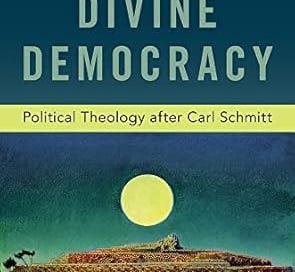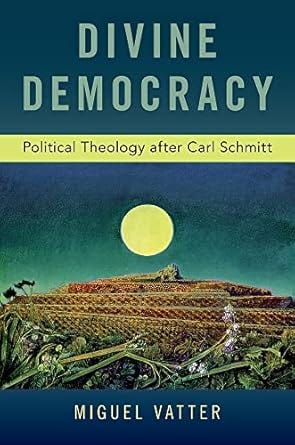I have just finished reading Miguel Vatter’s Divine Democracy: Political Theology after Carl Schmitt (Oxford: OUP, 2021), which is a fine read.
The blurb reads:
How secular are the political and legal concepts that underpin liberal democracy? Carl Schmitt first coined the term “political theology” to show the dependency of modern western jurisprudence and political science on Christian theological discourse, and in so doing criticized the claim to religious neutrality of liberal institutions. In this book, Miguel Vatter reconstructs how and why the discourse of political theology was adopted and repurposed by anti-Schmittian thinkers, from Eric Voegelin through Jacques Maritain and Ernst Kantorowicz to Jürgen Habermas, to bolster the legitimacy of liberal democratic government. The book traces the way in which crucial political concepts for liberal democracy--including sovereignty, representation, government, constitutionalism, human rights, and public reason--are transformed when they become part of a discourse on political theology. Vatter's aim is to provide an intellectual history of political theology in the 20th century. His study reveals the overdetermined role that religion plays in contemporary democratic political and legal theory as an ultimate source of legitimacy for government and as wellspring for revolutionary aspirations.
What I find interesting is how political theorists have often appealed to Gnosticism as a political category for the attempt to delegitimize earthly authority.
Now, by Gnosticism, political philosophers are not using the term the way historians of early Christianity do, it is a somewhat metaphorical or analogical idea of Gnosticism they have in mind.
The real issue is how do you legitimate authority?
If you believe that authority comes from God who gives anointed kings power from on high, then if the king is bad, you will be tempted to rage against God, kings, and nature to delegitimize a bad government by appeal to some other source, principle, or idea.
“By Gnosticism,” Vatter points out what some political philosophers have in mind “is the phenomenon of hatred of power or mis-archy; that is, the tendency to resort to a radically transcendent source of salvation in order to end the disasters wrought by political power on earth” (19). Some political theorists are fascinated by the idea that there is an alien god “who leads the revolutionary struggle against the God of orthodoxy who vouches for the Throne and Altar” (241).
In any case, Vatter’s book is a fascinating exploration on the theological roots of democratic legitimacy, how theological ideas can be brought into secular expression, and how all politics really is subliminal theology!





I don’t know how you read so many books so fast Dr. Bird? Godbless blessed you with great gift I wish I could read that fast and had more time in life